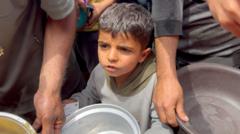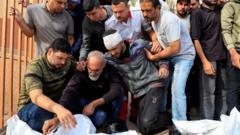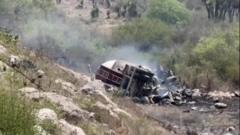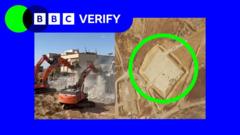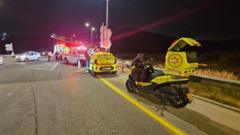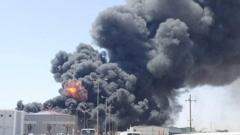### Summary: Nearly 100 individuals, including children, have died in a significant Israeli air, ground, and naval operation targeting northern Gaza. The humanitarian crisis deepens as residents face intense bombings and evacuations amidst an escalating conflict.
### Title: Devastation in Gaza: Close to 100 Lives Lost in Latest Israeli Assault
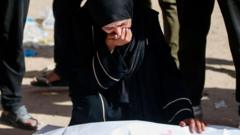
### Title: Devastation in Gaza: Close to 100 Lives Lost in Latest Israeli Assault
### Description: A series of Israeli attacks in northern Gaza results in mass casualties as civilians continue to bear the brunt of ongoing military actions.
---
Nearly 100 people have reportedly lost their lives, including several children, in a sweeping Israeli operation involving ground, air, and sea attacks in northern Gaza, according to sources from the Hamas-run civil defense and local witnesses. These strikes, which occurred early on Friday, led to extensive destruction, with the civil defense confirming the bombing of at least nine civilian homes and tent structures overnight. Numerous calls for help have flooded in as residents struggle to escape the devastation.
Witnesses described the night as chaotic, with Basheer al-Ghandour, a local who fled the affected Beit Lahia area, recounting how heavy bombardments struck without warning while families were asleep. “It came from all sides—air strikes and warships,” he shared, noting the collapse of his brother's house, which claimed several lives, including that of young children. Others shared harrowing accounts, including Yousif Salem, who narrowly escaped an attack on his neighbor's home, witnessing fatalities moments before his own family made a desperate escape from imminent danger.
According to eyewitness accounts, the assault commenced with smoke bombs followed by ferocious artillery fire from Israeli positions. Ground troops began advancing toward a school sheltering displaced civilians, and military aircraft dropped leaflets instructing residents to evacuate the area, inciting fear among families already displaced multiple times.
As fears mount over a prolonged military campaign in one of the world’s most densely populated areas, many have expressed uncertainty about their next steps. Sana Marouf, a fleeing resident, commented on the dire situation, stating, “I swear I don’t know where we’re going,” emphasizing the desperate lack of resources as the humanitarian crisis escalates.
This latest attack follows Israeli air strikes that claimed over 120 lives in the southern region of Gaza just a day prior. Israel's military asserts it has targeted over 150 "terror sites" throughout Gaza in a push described as part of an ongoing strategy to dismantle Hamas infrastructure. The Israeli government has suggested that operations may intensify further, hinting at the possibility of a complete reoccupation of Gaza should negotiations fail to yield a ceasefire.
The humanitarian situation has been exacerbated due to Israel’s imposition of a comprehensive blockade on aid, leading to concerns of famine prompted by a recent UN report indicating that the entire population of Gaza, approximately 2.1 million, is at critical risk. Despite claims from the Israeli government that food is accessible, humanitarian groups report widespread starvation, leading to increasing international concern, including statements from US officials recognizing the severity of the crisis.
This military escalation is part of Israel's broader campaign to eradicate Hamas, a direct response to the group's cross-border attack on October 7, resulting in substantial loss of life and hostage situations. With the toll reaching at least 53,000 fatalities in Gaza since the onset of conflict, and dozens of hostages remaining captive, the prospects for peace seem further away than ever.
Nearly 100 people have reportedly lost their lives, including several children, in a sweeping Israeli operation involving ground, air, and sea attacks in northern Gaza, according to sources from the Hamas-run civil defense and local witnesses. These strikes, which occurred early on Friday, led to extensive destruction, with the civil defense confirming the bombing of at least nine civilian homes and tent structures overnight. Numerous calls for help have flooded in as residents struggle to escape the devastation.
Witnesses described the night as chaotic, with Basheer al-Ghandour, a local who fled the affected Beit Lahia area, recounting how heavy bombardments struck without warning while families were asleep. “It came from all sides—air strikes and warships,” he shared, noting the collapse of his brother's house, which claimed several lives, including that of young children. Others shared harrowing accounts, including Yousif Salem, who narrowly escaped an attack on his neighbor's home, witnessing fatalities moments before his own family made a desperate escape from imminent danger.
According to eyewitness accounts, the assault commenced with smoke bombs followed by ferocious artillery fire from Israeli positions. Ground troops began advancing toward a school sheltering displaced civilians, and military aircraft dropped leaflets instructing residents to evacuate the area, inciting fear among families already displaced multiple times.
As fears mount over a prolonged military campaign in one of the world’s most densely populated areas, many have expressed uncertainty about their next steps. Sana Marouf, a fleeing resident, commented on the dire situation, stating, “I swear I don’t know where we’re going,” emphasizing the desperate lack of resources as the humanitarian crisis escalates.
This latest attack follows Israeli air strikes that claimed over 120 lives in the southern region of Gaza just a day prior. Israel's military asserts it has targeted over 150 "terror sites" throughout Gaza in a push described as part of an ongoing strategy to dismantle Hamas infrastructure. The Israeli government has suggested that operations may intensify further, hinting at the possibility of a complete reoccupation of Gaza should negotiations fail to yield a ceasefire.
The humanitarian situation has been exacerbated due to Israel’s imposition of a comprehensive blockade on aid, leading to concerns of famine prompted by a recent UN report indicating that the entire population of Gaza, approximately 2.1 million, is at critical risk. Despite claims from the Israeli government that food is accessible, humanitarian groups report widespread starvation, leading to increasing international concern, including statements from US officials recognizing the severity of the crisis.
This military escalation is part of Israel's broader campaign to eradicate Hamas, a direct response to the group's cross-border attack on October 7, resulting in substantial loss of life and hostage situations. With the toll reaching at least 53,000 fatalities in Gaza since the onset of conflict, and dozens of hostages remaining captive, the prospects for peace seem further away than ever.



